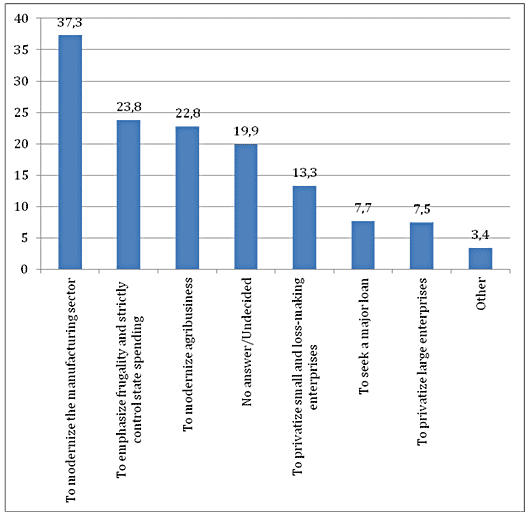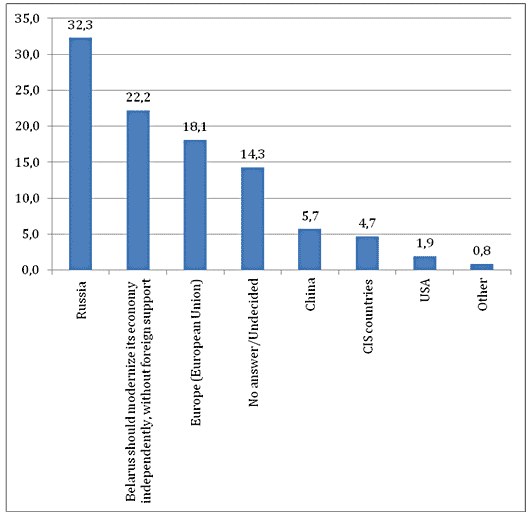The Most Momentous Events of 2012 through the Prism of Public Opinion
Nadezhda Yefimova
Summary
Starting in February and throughout the year 2012, mass consciousness showed a trend towards adapting to the new economic environment, which was manifested in a return to the economic self-perception indicators observed in previous years. However, emotions are different behind the same figures – the anticipation of a new wave of crisis was a permanent factor in 2012. Modernization of production assets is perceived as an essential measure to boost the national economy and improve living standards. When it comes to the choice of allies for Belarus to rely on for modernization, the general geopolitical orientations of the Belarusians become obvious, as 32.3% of the respondents believe that Belarus should appeal to Russia, whereas 18.1% speak in favor of the European Union.
Trends:
- Adjustment and specific adaptation of the Belarusians to the new economic environment;
- Relatively high public expectations of a large-scale modernization;
- A gradual increase in the number of supporters of the abolition of capital punishment.
Socioeconomic sentiment
Following the peak of negative assessments and panic, which transformed into an unprecedented readiness to participate in street protests (estimated at 25%), a process that can be described as “reverse adaptation” (a term coined by Andrei Vardomatsky) began in February 2012. It should not be mistaken for normalization of people’s social sentiment. Although the share of negative assessments of the economic situation in the public opinion began to go down, while the share of neutral assessments started to grow, this cannot be called stabilization or a return to the status quo, because one of the essential characteristics of the emotional state of the Belarusians is the permanent expectation of a second wave of crisis. Moreover, in December 2012, the trend reversed, as negative assessments of the situation in the country went up to 32% from 26%, while neutral assessments dropped to 50% from 58%.
Overall, the sentiments registered in 2012 were more positive than those observed in 2011 – back in 2011, only 14.2% of the respondents called the year favorable for Belarus, whereas in 2012, the figure grew to 43.9%.
When asked about their personal life, 62.1% of the Belarusians called the year 2012 favorable, up from 43.7% in 2011. It seems the crisis-induced tensions had been overcome by the end of 2012. It is especially important, though, that positive assessments of the economic situation never reached the level recorded during the most favorable years (2005, 2006, and 2010), but correspond mostly to the indicators registered at the start of the decade.
The difference in the assessments of the economic status of the country and personal financial situation has remained unchanged during the last ten years (which can be interpreted as the high dependence of citizens on the state). However, during the year 2011, affected by the crisis, the gap between the assessments of personal well-being and financial health of the state widened –people turned out to be way more pessimistic about the situation in the country than they were about their personal finance (their household). The respondents must have thought this way: “the state has had a bad year, but the year has been quite acceptable for me.” In 2012, the gap narrowed a bit, but remained broader than in previous years. The crisis may have encouraged people to rely less on the state and work out their own survival strategies and create “airbags” (such as labor migration).
Focus on modernization
The answers to the question “What measures should the Belarusian administration take in the first place in order to improve the economic situation in the country and raise living standards?” (spring 2012) indicate that the traditionally strong stereotype about the importance of frugality was no longer a priority (23.8%) (Fig. 1). The cautious attitude to privatization was almost unchanged – only 13.3% of the respondents said that small and loss-making enterprises should be privatized, and only 7.5% spoke in favor of the privatization of larger enterprises. As for modernization, especially the modernization of manufacturing companies, the Belarusians believe it to be an important measure that should be taken immediately.

The influence of the mass media was an important factor shaping people’s opinions. According to our observations, media reports constantly raised the topic of modernization in industry and agribusiness throughout the year. There was another reason why modernization became more relevant than before. In March 2012, the European Union inaugurated the European Dialogue on Modernisation with Belarus with a view to facilitating the modernization of Belarus with the European Union’s financial support and consultations. The initiators of the project said that the “Dialogue on Modernisation will give Minsk a chance to introduce some long-overdue reforms.”
Asked whose support Belarus should seek to modernize its assets, the respondents answered as follows: a) the majority believes that Belarus should rely on Russia’s assistance and support (32.3%), b) 22.2% of the respondents said that Belarus should pursue modernization independently, and c) 18.1% said the country should seek help from the EU (Fig. 2).

The respondents who believe that Belarus should modernize its economy with the help of the European Union (18.1%) give two reasons for their choice. The first one is that the EU has the most advanced technologies (49.8% of those who spoke in favor of the European choice); the second reason is that this support would help Belarus become a fully European state and tip the scale towards the West when Belarus sorts out development priorities (42.4%).
Attitude to capital punishment
One of the highest-profile cases of 2012 was the execution of Kanavalau and Kavalyou, who had been found responsible for the Minsk metro blast in 2011. The case drew the attention of the international community; many individuals and NGOs in Belarus and abroad condemned the verdict, while the official media reported that evil had been punished and justice had been served. The public response to the execution helped outline the general attitude to this issue (the question about people’s attitude to capital punishment was asked in 2008, 2009 and 2011).
There have always been more opponents of the abolition of capital punishment in Belarus than there have been supporters. According to NOVAK, there were twice as many Belarusians speaking in favor of capital punishment than there were those who wanted it abolished in 2009. However, in 2011–2012, the shares of “opponents” and “proponents” were almost equal (the share of those against the abolition of capital punishment was slightly higher). The youngest respondents, aged 18–24, showed the highest proportion of those in favor of the abolition of capital punishment, at 56.3%. Older respondents (aged more than 45) are mostly in favor of preserving capital punishment.
The proportions of those for and against the abolition of capital punishment are equal among males, whereas among females, there are more opponents of the abolition (possibly due to the propensity to make simple and effective decisions and traditionally high level of trust in the state). There is no linear correlation between the level of education of respondents and their attitude to capital punishment, although those with higher education stand out with a significantly higher share of those in favor of the abolition of capital punishment.
The group of those supporting a closer relationship between Belarus and the EU mostly includes advocates of the abolition of capital punishment.
Conclusion
In 2013, public social sentiment will likely stabilize at the level achieved in the second half of 2012, although it will largely depend on the economic situation in the country. The general trend outlined above applies to the year 2013 – expectations are more optimistic than they were in 2011; however, they are still below the level of “favorable” years (2005, 2006 and 2010) (Table 1).
| 2003 | 2004 | 2005 | 2006 | 2007 | 2008 | 2009 | 2010 | 2011 | 2012 | |
|---|---|---|---|---|---|---|---|---|---|---|
| Hope | 44.9 | 56.6 | 66.2 | 64.2 | 56.3 | 43.9 | 58.8 | 65.7 | 44.2 | 58.9 |
| Anxiety | 24.1 | 19.5 | 13.7 | 15.8 | 21.1 | 29.4 | 21.3 | 15.1 | 23.9 | 16.0 |
| Uncertainty | 27.4 | 17.8 | 16.4 | 16.2 | 17.9 | 23.5 | 15.7 | 15.3 | 28.2 | 22.5 |
| No answer/Undecided | 3.6 | 6.1 | 3.7 | 3.8 | 4.6 | 3.2 | 4.2 | 3.8 | 3.8 | 2.6 |